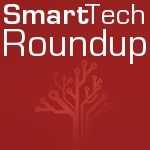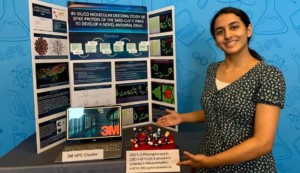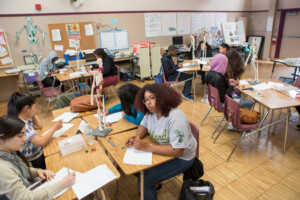SMARTtech Roundup: STEM, Core and More

Blended Schools & Tools
Learn Now, Lecture Later. A new survey called “Learn Now, Lecture Later” from CDW-G found that high schoolers want more hands-on projects, independent study and virtual learning. The report is based on a spring 2012 survey of 1,015 public high school and higher education students, faculty and IT professionals. The survey also revealed that the majority of faculty and students now use notebooks and netbooks as classroom learning tools (75 percent of students and 72 percent of faculty overall), as well as digital content (69 percent of students and 73 percent of faculty). Learning management systems were in use by a smaller majority, with 56 percent of students and 58 percent of faculty members reporting they use an LMS in the classroom.
Online PD for Blended Learning. Teaching in a Blended Learning Model, the newest professional development course from Florida Virtual School (FLVS) is now available. The fourth offering in the FLVS Teaching Online PD Series, Teaching in a Blended Learning Model is filled with best practices for virtual and classroom environments and can be accessed 24/7. Designed for teachers who are new to blended learning or school leaders ready to create a blended environment, the course focuses on expanding skills by demonstrating specific strategies to optimize instruction.
A Better Blackboard. Blackboard Inc. announced updates to its Web conferencing platform with the release of Blackboard Collaborate 12. The new version adds enhanced integrations for learning management systems, user experience improvements that make the system more accessible, and plans to add support for mobile access.
Summer blends. USA TODAY reported that schools nationwide have adopted hybrid summer-school courses in which academics are blended with recreation to help curb summer learning loss. In Miami, officials are hoping to keep students learning over the summer by implementing a Web-based program, called the “e-learning wave.”
Blending in BC. Rossland Secondary School will be one of the first schools in British Columbia to delve into blended learning. The goal is to provide personalized and inquiry based learning in a blended learning environment, which will offer students a variety of courses, even within a smaller school environment.
Keeping Tabs on Tablets
In iPad news. Writing for Edutopia, administrator Ben Johnson showed readers how the iPad can transform digital learning. Teachers and leaders who agree are excited to hear about Apple’s announcement of a new (and free) iPad-In-Education Webcast Series for Teachers.
Interesting Alternatives. Education World is tracking the trend of Kindle Fire use in the classroom. eSchool News offered seven iPad alternatives for schools (and that’s not counting the new Google and Microsoft tabs)–three of which were designed specifically for schools.
Digital Developments
Innovation Slip. EdWeek reported that after ranking 7th in 2011, the U.S. is ranked 10th in this year’s Global Innovation Index, a massive report published by Insead, an international business school, and the World Intellectual Property Organization, an agency of the United Nations. The report ranks 141 nations on nearly 100 factors related to innovation, in areas like “Business sophistication,” “Human capital & research,” and “Knowledge & technology outputs.” Switzerland and Sweden are ranked Nos. 1 and 2, respectively, for the second straight year. Rounding out the top five are Singapore, Finland, and the United Kingdom.
Louisiana Believes. Louisiana State Superintendent of Education John White released the Louisiana Technology Footprint, a report and set of technology guidelines that provide a snapshot of the current state of digital readiness of school districts and campuses in the state. Louisiana Believes, the state’s comprehensive plan to empower educators and parents to make the best choices for children, includes a goal for all schools to be digital-ready by 2014-2015.
E-learning Caucus. Wednesday marked the first meeting of the Congressional E-Learning Caucus, co-chaired by Reps. Jared Polis (D-CO) and Kristi Noem (R-SD). Speakers included: Michael Kowalski of Fairfax County (VA) Public Schools, Scott Jenkins of Western Governors University, Becky Takeda-Tinker of CSU’s Global Campus, and Judy Komar of Career Education Corporation. Click HERE for iNACOL’s Twitter notes from the audience.
Online Okies. Oklahoma City Public Schools is launching a free online school. The district expects about 700 students to enroll. Educators expect to see a boom in online education in the fall now that rules have been established requiring every school district to offer online courses.
Google MOOC. Google’s free online course “Power Searching with Google” began this week will be offered over the next two weeks. Officials say the courses are intended to help people learn new techniques for using the search engine. The Getting Smart crew is enjoying our first MOOC.
Myth-busting interview. K12’s Jeff Kwitowski is featured in an interview spotlight called “A Profile of k12, Provider of Online Curricula” to discuss online learning.
mLearning and More. The 2012 National Survey on Mobile Technology for K-12 Education, published by IESD Inc. is now available for purchase. The report defines both the opportunities and the challenges of breaking into this new market and it will help company executives make smart decisions about mobile technology development and addresses levels of mobile adoption, benefits, apps, and expected price points.
Steamy STEM Gems
Introducing I-STAR. UC Davis has received a $1.6 million grant from the S.D. Bechtel Jr. Foundation that will allow it to improve STEM education in schools throughout Davis and Dixon.
STEM scouts. In Tennessee, boyscouts at Camp Buck Toms will be able to earn four new badges in robotics, nuclear science, energy and composite materials thanks to $150,000 gift from UT-Battelle to fund the STEM scouting initiative.
STEM Mentors. The Atlantic reported on an NSF-funded MentorLinks program that offers a good model for investing in the future of workforce training. The grantees represent a range of technical education programs from across the country, and each is matched with a mentor who has knowledge and connections in the area of STEM training the grantees plan to develop, with mentors receiving a small stipend. Working closely with their mentors, faculty and staff from the colleges endeavor to establish or strengthen a specific program, often in partnership with regional and local partners in government and industry.
Sparking STEM learning. SparkTruck offers a STEM education on wheels. TechCrunch notes: “SparkTruck literally parks a engineering bench outside of schools, lets students play with the latest in maker technology, and has managed to have a measurable impact on students’ path towards a career in science.” Cool.
Getting to the Core
Painting the P21 Picture. P21 Executive Director Tim Magner shared his vision of what a modern classroom should look like on CNN Schools Of Thought blog and spoke to the Common Core standards as a facilitator of 21st century learning.
21st century fine tuning. eSchoolNews reported on a new online writing assessment tool called FineTune: an online professional development tool for supporting teachers in the rubric-based evaluation of student writing. According to AcademicMerit, teachers can use the program to calibrate their assessment of students’ writing to match up with a comprehensive rubric, the Common Core standards, and each other. Here at Getting Smart, we believe online scoring will lead to more and better writing.
ELD and CCSS. EdWeek reported: “In California — where about 25% of the student population are English-language learners — officials are working to align their English-language development standards with the Common Core State Standards. The state recently released standards by grade level, and officials hope to have them approved by the end of the summer, following a period for public comment.”
The Hunt Institute launched a Common Core video channel with some great resources like this video featuring ELA architect (and incoming College Board CEO) David Coleman.
Come On Get App-y
Do you remember life BiP? In this AiP world, HuffPo Parents asks: How much “digital candy” should be a part of the regular child’s diet and how can we find high quality educational apps?
App for collaboration. Prague Startup mySchoolNotebook.com Expands To US. This note-taking app enables students to take notes, organize them into notebooks and even add audio to the notes. The app uses Facebook authorization, and Facebook adds a conduit for sharing notes with fellow students that may be collaborating on an assignment together.
Higher, Deeper, Further, Faster Learning
Props to Pearson, Propero and NAU. Northern Arizona University is collaborating with Pearson to co-develop three fully online baccalaureate competency-based degree programs. NAU plans to offer competency-based courses and bachelor’s degrees in business administration, computer information technology and liberal studies beginning in January. The new models will save the university and the students both time and money. Back in April, Tom wrote about Propero – this low-cost, Pearson-powered higher ed solution.
Press for Pathbrite. Check out this interview with Heather Hiles on FoxNews.com talking about digital portfolio solution Pathbrite.
Democratizing learning down-under. This story out of Australia notes that “a new wave of online courses throws open the doors of academia to all” and offers up new types of teaching and learning to “lift the morale of academia.”
DIY Professor Publications. The rising cost of textbooks, increases in online publishing tools, and growing availability of open-source materials have led to more professors creating their own materials to replace traditional texts. The Chronicle reports how 3 professors have used different models to publish their books online and have enabled student access.
The Big “D”
Innovation platform. Internet2, the high-speed U.S. educational research network, is nearing completion of its OpenFlow-enabled 100G Ethernet software-defined network for testing service delivery of applications for Big Data compilation and research.
Debunking. The Michael & Susan Dell Foundation is blogging on Big Data and taking on myths and misconceptions.
Movers, Shakers & Ground-breakers
Michael Q. McShane has joined the American Enterprise Institute (AEI) as a research fellow in education policy studies.
SETDA has announced the formation of its 2012-13 board of directors and officers.
Sloan-C will present its 2012 Effective Practice Awards at the 5th Annual International Symposium for Emerging Technologies for Online Learning, July 25-27, in Las Vegas. The winning practices were selected for recognition because they provide evidence of innovation and replicability. The practices advance the goals of access, learning effectiveness, faculty and student satisfaction, and scalability.
Mashable reported on the more than 350 students from 75 countries that are in Sydney competing in the Imagine Cup 2012 Worldwide Finals. The students are tasked with solving some of the world’s most pressing social problems — hunger, the environment, disease and energy use, among others. Now in its 10th year, the students use Microsoft’s latest technologies as their tools.
Disclosure: K12 and Pearson are Getting Smart Advocacy Partners.






0 Comments
Leave a Comment
Your email address will not be published. All fields are required.